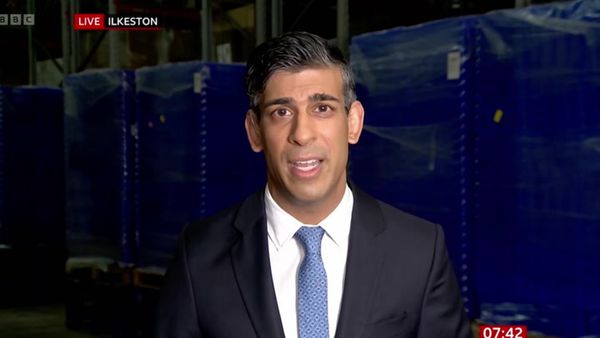
The vacant land of the former Bulimba Barracks snakes its way around a bend on the banks of the Brisbane River.
Here, the river widens and seeps into the fabric of the surrounding suburb – skiffs and canoes sit beside SUVs and road bikes in the garages of restored timber cottages, old Queenslanders and villas adorned with lush, subtropical gardens.
Few people who live outside Bulimba would have visited the barracks since it was sold by the federal government in 2020.
Established as an industrial base by the US military in 1943, 80 years later this 20 hectares of the land has become a flashpoint in a national debate around the need to increase housing supply and to preserve urban green space.
At the centre of much of this debate is Greens MP Max Chandler-Mather, who prised the surrounding electorate of Griffith from Labor at the last federal election.
The Greens’ housing spokesperson has led a long-running community campaign against a proposal, approved by Brisbane city council in November, to build more than 850 dwellings, mainly apartments, on the prime, riverfront land.
The campaign has come under increased scrutiny since Chandler-Mather became the face of the Greens opposition to Labor’s signature housing policy, the $10bn housing Australia future fund.
Last week Anthony Albanese said it was “remarkable” Chandler-Mather was “running petitions” to block the “development of more housing supply in Brisbane”. Other attacks have been more personal. Labor Senate leader Penny Wong was forced to withdraw comments that the Griffith MP was putting his “ego” and desire for media attention above the need for more housing for victims of domestic violence promised by the future fund.
Labor clearly smells blood, hoping to paint the Greens as nimbys whose anti-development stance is blocking the housing supply necessary to halt escalating prices. Brisbane’s Labor council opposition leader Jared Cassidy says the Greens speak “a big game about the need for housing, but at every opportunity say ‘not here’ or ‘not there’”.
The closer you get to the development, though, the quieter the Labor rhetoric. The local councillor, Labor’s Lucy Collier – who lives in Bulimba and is just weeks into her new role – said she shares “the concerns of residents that there needs to be improved traffic management and public transport amenities”.
There is nothing muted, however, about the position of Brisbane’s LNP mayor Adrian Schrinner, who, in a five-line written response on the topic, used the word “destructive” five times.
“When it comes to housing, it’s the same old nimby approach from the destructive Greens, just with a whole lot of new excuses,” Schrinner said.
‘A very vulnerable location when it comes to inundation’
Chandler-Mather “first and most pressingly” takes issue with the fact “almost the entire Barracks site sits within a floodplain”, and that he believes the solution proposed by its developers, the Shayher Group, to raise the land by up to 2.4 metres, risks displacing flood water on to surrounding properties.
In approving the development, council said “the submitted Hydraulic Impact Assessment demonstrated that the required earthworks will not result in adverse flood impacts on adjoining properties”.

Chandler-Mather also says the development will require the removal of more than 800 mature trees (council says any vegetation removal will be subject to future approval) and criticises the fact it won’t result in a single affordable home – let alone social housing.
“There is literally no hard economic evidence that allowing property developers to build high-end apartments that no one can afford tackles the housing crisis,” he tells Guardian Australia.
“In fact, often it drives up the cost of rent and house prices”.
Instead, Chandler-Mather argues the land should be bought back by the federal government and turned into parkland and community facilities, with “a small portion of affordable housing in the areas not at risk of flooding”.
Griffith University urban planner Tony Matthews says with a growing population, Australians need to “get realistic” about where new homes are to be built. He notes that rental availability rates in Brisbane have been hovering at or below 1% for more than a year “across the board, irrespective of socioeconomic status”.
Yet Matthews, who lives south of the Brisbane River and knows the Bulimba site, describes some of the criticisms of Chandler-Mather for his opposition to the development as “disingenuous”.
“His objections to that particular Barrack development are actually, in many ways, quite sound and have nothing at all to do with blocking housing,” the urban planner says.
“It’s a very vulnerable location when it comes to inundation.”
And as much as our cities need to densify and expand, “we have to leave some of it empty,” Matthews says.
“If we were to leave all of our space available for housing, we’d end up in an urban dystopia with no green space at all,” he says. “There has to be a balance between hard surfacing in a city and then green; there just needs to be, for a thousand different reasons.”
Matthews argues that part of the reason many are “spooked” about increased density in their own back yards, is that Australian architects, planners, designers and property developers “have exercised very mediocre imagination” around how to achieve it in “a functional and elegant form”.
“There are other ways of achieving density and liveability,” he says.

And it is another way that attracts Brisbane author Dianne McLay, whose timber and tin home overlooks the neighbouring 0.5 hectare Tugulawa Park that is to be bisected by a four-lane road leading into the adjoining Bulimba Barracks site.
McLay says she is not opposed to homes being built on the old barracks – she says she is not “anti-development,” just anti-bad development.
She wants to see more green space incorporated into the plans, as well as some affordable housing, allowing young professionals like teachers to buy in the area.
McLay says there are a lot of children and young people in Bulimba and that “that diversity that makes it a lovely suburb”.
“But when you just create one sort of housing, you lose that community,” she says.
For raising these concerns, McLay says she too has been labelled a nimby.
Chandler-Mather argues that label is nothing but a “distraction” from “the core issues that are driving the housing crisis” – and a way to shift blame.
Instead the Greens housing spokesperson blasts an ongoing “generational missed opportunity” to secure land for and build rent-controlled, affordable and public housing.
He argues for the phasing-out of negative gearing and capital gains tax concession and the control rents, a paradigm shift that changes the concept of housing from a money-making asset to “a roof over someone’s head”.
And as long as the Greens prosecute these arguments, Chandler-Mather maintains, they will have “a target on our back”.
“Because we are challenging the people who make billions of dollars every year on housing,” he says.
Guardian Australia approached Shayher Group for comment.







